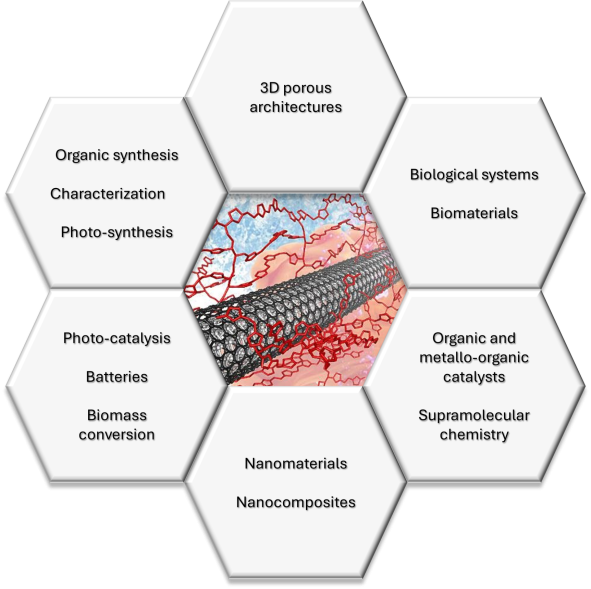The expertise of the Functional Structured Materials (FSM) pole is divided into two interconnected areas: the development of 3D porous architectures and the functionalization of nanostructures.

The first area of expertise of this research cluster includes: the development of 3D porous architectures, including hierarchical organizations, metal-organic frameworks (MOFs) or MOF-like systems, biological, organic/inorganic hybrids, organic and organometallic catalysts.
The second area of expertise is the functionalization of nanostructures such as carbon nanotubes, silicates, crystalline porous organic salts and surfaces. These materials and their applications cover a variety of current topics in chemistry and physics: batteries, CO2 conversion, biomass conversion, (photo)catalysis, inhibition of viral and/or bacterial pathogens, biomaterials, sensors, heterogeneous and homogeneous catalysts, small molecule activation, supramolecular chemistry.
Characterization of these materials is carried out using advanced analytical equipment: NMR (solid and liquid), X-ray diffraction, high-resolution mass spectrometry, chromatographic methods, electron microscopy, nitrogen physisorption, X-ray photoelectron spectroscopy, nuclear reactions and nano-indentation, elemental analysis, thermal analysis, stopped-flow spectroscopy.
Keywords
Batteries, catalysis, porous materials, materials characterization, functionalized nanomaterials.
Permanent members and associated research units
Associated research units
Faculty of Science, Department of Chemistry
Unité de Chimie et d'Electrochimie des Surfaces et Analytique (UCESA)
Chimie Electronique des Surfaces (CES)
Unité de Chimie des Nanomatériaux (UCNANO)
Chemistry of Applied Materials (CMA) - Chimie des Matériaux Inorganiques (CMI)
Unité de Chimie Organique (UCO)
Bio-Organic Chemistry (BOC) - Synthetic Organic Chemistry (SOC) - Reactivity and Organic Catalysis (RCO)
Unité de Chimie Physique Théorique et Structurale (UCPTS)
Structural Biological Chemistry (CBS) - Physical Chemistry of Biomolecules (CPB) - Laboratory of Theoretical Chemistry (LCT)

